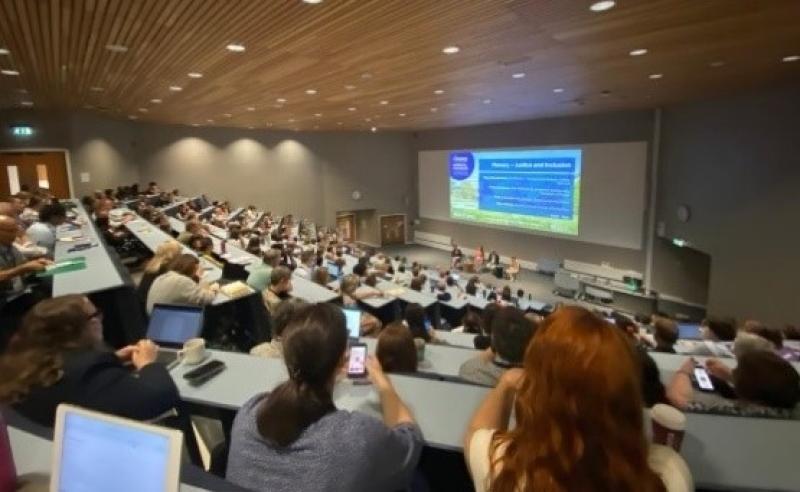You are here
- Home
- The EAUC Annual Conference 2023: in Kathleen and Franzi's words
The EAUC Annual Conference 2023: in Kathleen and Franzi's words

The EAUC Annual Conference 2023: Conversations on Climate Solutions was held at the University of Bath at the end of June and several OU colleagues were in attendance. Kathleen Calder, Senior Learning Designer, LDS, and Franzi Florack, Senior Strategy Manager, Strategy Office have shared their experiences in this blog post.
The conference gave those in attendance the opportunity to connect with one another and explore the sustainability challenges the HE sector faces. Collaboration between HE and FE institutions is critical to ensure that we meet these challenges, but we also need to consider our wider influence and collaboration opportunities to keep pace with climate action. You can also find the all the resources from the conference here.
In Kathleen’s words…
I was really pleased to be invited by the OU sustainability office to attend the EAUC Conversations on Climate Solutions conference. I found it really valuable and motivating to meet people working on similar sustainability initiatives at other HE and FE institutions.
There were thirteen workshops over two days, which was quite an intense experience, however, the first night featured a social dinner and silent disco – which was a welcome chance to relax and get to know others more informally. The conference demonstrated to me that connection really is key to collaboration and solutions. For me, stand-out sessions were the University of Gloucestershire's student-led Anti-Greenwash education toolkit; the University of Glasgow's 'stealth' approach to embedding sustainability, and Change Agents' reflection on self-awareness and values.
Due to my role as a Senior Learning Designer in LDS, I went to the workshops that focussed on the Education for Sustainable Development (EDS) strand. I found that many of the challenges faced, and solutions being developed in other institutions, are similar to ours - from the use of terminology, finding 'ways in' to existing processes, working with anxiety, and developing an enabling environment.
It was particularly interesting to hear how others were using student voice and co-creation for developing resources and toolkits as the OU Learning Design team is running a curriculum design student panel (CDSP) activity in July 2023 (this month) requesting student feedback on resources that support the design of sustainability skills and competencies in course materials.
A personal highlight was meeting lots of people who were excited to speak to someone from The Open University. Our expertise in distance learning at scale is recognised and valued and others were keen to discuss how our unique status provides opportunities within which we can make a unique and significant contribution to Education for Sustainable Development.
In Franzi’s words…
Due to family commitments, I was only able to attend one day of the Alliance for Sustainable Leadership in Education (EAUC) conference, however, I learned a lot in my day at the University of Bath.
My role at The Open University is Senior Strategy Manager in the Strategy Office and I have a keen interest in sustainability, in particular the interrelationship between sustainability and EDI. I primarily took part in discussions and presentations related to this, all of which made it disappointingly clear that the sector has made very little progress since the Equality Act was published in 2010.
EDI is an important aspect of Sustainability, as much impact from Climate Change disproportionally affects people from a Black and Ethnic Minority background and all solutions to the climate crises rely on building better practices in collaboration. I was most impressed by the Ethnic Representation Index which charts the UK’s HEIs’ Black, Asian, and Minority Ethnic student and staff populations as well as their representation, retention, and attainment. It ‘gives a comprehensive perspective on the different aspects of becoming an anti-racist institution.’ Although it may be uncomfortable for institutions, publishing data such as this is critical for understanding these problems and taking accountability.
In one discussion session, Robin Landman (OBE), Director at Black Leadership Group, pointed out that institutions with anti-racism policies and statements are often well-meaning but there are no tools for actions. This got me thinking about The Open University’s Union Black course. Like most of the rest of the sector, the OU has struggled with its EDI targets, but its Union Black course is a step in the right direction. The short course, exploring Black British history, Black cultures, and steps to anti-racism was part of a UK-wide initiative to tackle racism and racial harassment in higher education. It was developed in partnership with Santander Universities and was provided free to all staff and students at the OU.
I will continue to use the Ethnic Representation Index in my work in the Strategy Office and have also shared what I have learned at the EAUC conference with my colleagues.
Related articles
- Supporting climate action through digital education: new free BOC 26th February 2024
- Introducing a new free course - Climate Psychology: facing the climate crisis 8th February 2024
- Climate Change and machine learning - Climate Perspectives 8th February 2024
- Go Green: What is eco-anxiety? 8th February 2024
- Go Green: Fashion Fixing and Mending 8th February 2024